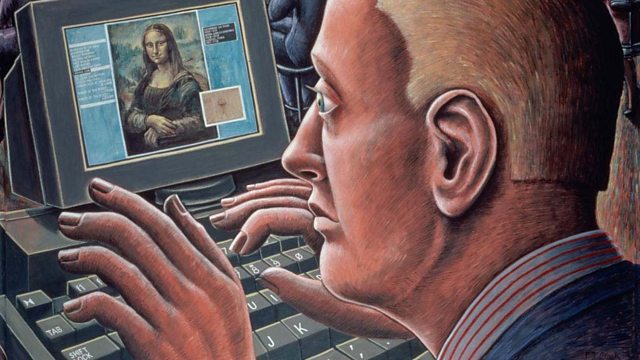Information Technology
Melvyn Bragg discusses whether the information technology revolution will radically alter society by empowering the individual, or damage family life, the work-place and even democracy.
Melvyn Bragg discusses the social and economic consequences of the information revolution. There are now more than 200 million people connected to the internet world-wide. The worldβs biggest ever merger has just seen Time Warner united with the internet service provider America Online, and in the United States alone it is predicted that transactions conducted in cyberspace will account for 327 billion dollars worth of business by 2002. Should we be pleased? Is it the βthird waveβ as Dr Toffler predicted in 1980 - after the first wave, the agricultural revolution about 8000 BC and then the second, the Industrial Revolution three centuries ago.Is this change going to alter our society radically, empowering the individual and offering greater choice, or will information technology lead us into a dark age for society that destroys democracy, the work-place and family life? With Charles Leadbeater, Demos Research Associate and author of Living On Thin Air: The New Economy; Ian Angell, Professor of Information Systems, London School of Economics and author of The New Barbarian Manifesto: How to Survive the Information Age.
Last on
More episodes
Previous
Broadcasts
- Thu 13 Jan 2000 09:02ΒιΆΉΤΌΕΔ Radio 4
- Thu 13 Jan 2000 21:30ΒιΆΉΤΌΕΔ Radio 4
Featured in...
![]()
20th Century—In Our Time
Browse the 20th Century era within the In Our Time archive.
![]()
Science—In Our Time
Scientific principles, theory, and the role of key figures in the advancement of science.
In Our Time podcasts
Download programmes from the huge In Our Time archive.
The In Our Time Listeners' Top 10
If youβre new to In Our Time, this is a good place to start.
Arts and Ideas podcast
Download the best of Radio 3's Free Thinking programme.
Podcast
-
![]()
In Our Time
Melvyn Bragg and guests discuss the ideas, people and events that have shaped our world.



